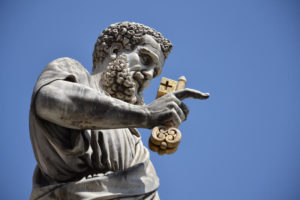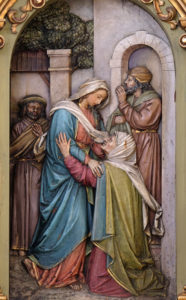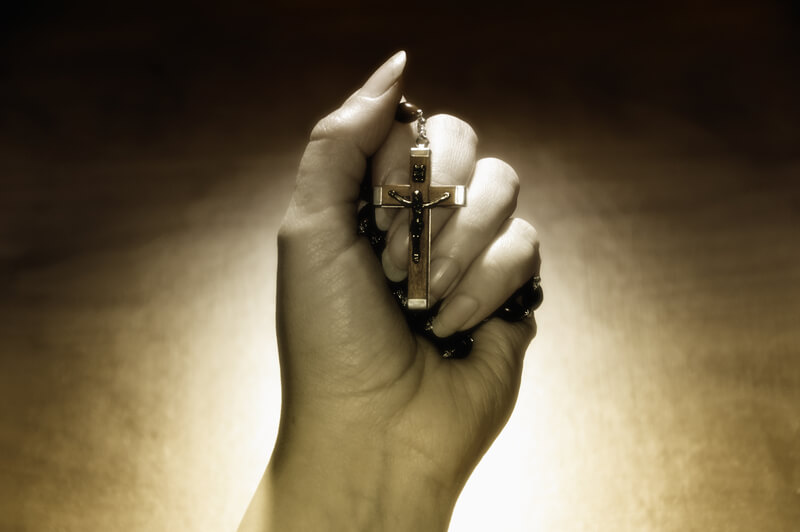There are many different types of prayer.
There are formal, memorized prayers, informal contemporaneous prayers, songs, and spiritual reading.
There are prayers of petition, thanksgiving, grace before meal, and aspirations.
There are others too numerous to mention here.
The Rosary, however, is a kind of a big prayer made up of many smaller prayers. It is a mix of many of those other types above, suited for praying at night either in a group or by yourself. One can pray the Rosary alone or together with others either before going to sleep, or when they’ve woken up in the middle of the night and want to go back to sleep.
It should be noted the Rosary is not limited to being prayed before bed. It’s not a bedtime prayer, per se. On several Internet forums, participants noted they preferred to pray the Rosary while walking, for example.
Contemplation in the middle of the night
During the Rosary, one contemplates joy, sorrow, glory, and the supernatural in a biblical context.
What’s powerful and compelling about praying the Rosary is how it can take a person out of their immediate difficulties and challenges. It can give them a mile-high view of their situation. It’s impossible to strategize well without a big picture.
Praying the Rosary is more complicated than praying other prayers simpler prayers. It calls for contemplation, and attention to format, while leaving room for individual preference, especially when it comes to the closing prayers.
Indeed, praying the rosary is a skill. The payoff for acquiring the skill is a heightened awareness of your spiritual condition, others’ spiritual condition, peace, and an improved relationship with God.
Why pray at all in the first place?
As humans, not everything is within our control. Dwelling on things we have no power to affect isn’t useful. Taking our cares and concerns up the “chain of command” is smart. Worry only about that which you have the power to affect. You can’t see the entire picture as a human.
The Rosary becomes a type of conversation with God. While shorter prayers have their place, the Rosary has pauses built in between groups of 10 prayers that allow for a conversation to occur by means of reflection. The Rosary is a powerful night prayer because it encourages listening and thinking.
That part about listening is missing in many of the other forms of prayer.
It’s also missing within the conventional secular responses to stress, like meditation.
In those systems, the meditator is encouraged to close their eyes and pay attention to their breathing.
While this can calm someone down, it’s akin to dealing with a problem with someone else by not talking about it.
You’re stressed, right? Something is causing you to respond with a stress response? You have to deal with it in some other way than paying attention to how your breath moves in and out of your nose or mouth.
When one is praying the Rosary alone or in a group before going to bed or in the middle of the night, the format works to calm one down.
In the very beginning, the process reminds you of what you believe. Then it opens with asking for “an increase in the gifts of the Holy Spirit (another name for God).” That is faith, hope, and charity.
Prayer and meditation aren’t the same thing. The Rosary prayer explores general truths espoused by Christianity that can be overlooked during the vicissitudes of life.
We’ll explore these ideas further in this article. First, however, we’ll talk about what the rosary is and isn’t. Unfortunately, there’s a lot of misinformation.
What is the rosary?
The rosary is two different things.
One definition is of a special set of prayer beads.
The second is the prayers on the special set of prayer beads.
As to what it’s not, the Rosary is not a prayer of worship to Jesus’ mother Mary. Catholics don’t worship Mary or any of the other saints. They worship the Trinity, the three expressions of God.
The word for Mary is venerate. And while there are similarities between the concepts, there are key differences. It’s worthwhile understanding the difference.
Venerate vs. worship
Bottom line: You’d venerate a hero. You worship a deity.
The idea of a hero in our modern society is somewhat strange to many. We pretty much live in a world without heroes. That’s the doing of our storytellers. Our media likes to look for the dirty, the bad stuff on everyone. Such stories are interesting.
A saint, in a way, is like a hero. They’re not perfect (though Catholics say Mary is as much as any human can be, the greatest of the saints).
There’s much in the character of a hero that’s worthy of emulation.
In Mary’s case, there was the way she responded to God’s call to give birth to the savior. She must have known she wouldn’t have a normal life. Plus, there was a stigma because she wasn’t married. There also was a chance that Joseph wouldn’t have her. Can you imagine what it must have been like for her? Then to watch her son being tortured to death?
You are free to struggle with Mary’s decisions. You can admit you wouldn’t have made the same decisions. You can admire them or not.
Heroes confound. Sully Sullenberger kept a calm head and put a distressed aircraft down on the Hudson River saving the lives of everyone aboard in 2009. A positive, healthy response to this is to want to be like that pilot when it comes to bravery, calmness, to level-headedness. The other things he may have done in his life that aren’t quite so admirable (whatever they are) aren’t so important. A hero is a positive example.
Hero worship isn’t healthy. Worship is reserved for deities. Veneration is for an exceptional human.
Why venerate Mary?
You can’t talk about the Rosary without talking about Mary. Many of the prayers are “Hail Marys.”
Mary is a very, very, very good human. You’re more able to identify with Mary or one of the saints, even if they’re so good that you might feel like you’ll never be that good.
You can ask yourself, “What would Jesus do?”
You should, but realize that the answer might not be entirely useful.

That’s because you can’t do everything exactly like Jesus.
You can try to approximate, sure, but it’s not always the same.
Jesus could and did cure many people even from a distance. You may be a doctor, but you still can’t cure people the way Jesus did.
Jesus could feed thousands just by speaking a few words over some bread and fish. You may be the CEO of an agricultural behemoth but even you can’t feed people the way Jesus did.
Same with the wine at the Wedding of Cana. You may have a huge vineyard but . . . you get the idea.
Jesus is God born of woman.
Jesus is at a whole new level compared to you and me. You can be inspired by Jesus. Jesus can and should point the way through life for you, but you’re never going to do the same kinds of things Jesus did.
You’re not omnipotent and omnipresent.
So what can you do?
You can start by looking at a level that’s more achievable.
Look to the examples of Mary and the other saints. Individual saints have come from all kinds of backgrounds, all kinds of places, and all kinds of time periods.
Of course, the human is going to fall short. None of us are perfect.

Take St. Peter. He was known to be outspoken, assertive, and loyal. Yet he denied knowing Jesus three times to save his skin. He lied!
Jesus didn’t lie. He paid the ultimate price.
To regard with reverential deference or admiring respect—that’s what it means to venerate.
Worship is reserved for a deity.
It’s an important and useful distinction.
So now all that background context is out of the way, here are five reasons the Rosary is a powerful night prayer.
1. The Rosary takes you out of your day-to-day concerns
This is very important and hard to do. Something is always going on with us. We’re feeling one way or another. Something is always going on with someone we care about. We need one thing or another.
Challenges in this life go on, day after day without end.
The Rosary promotes the big picture.
If you’re upset about something and it happens to be the day that you’re praying the Joyful mysteries, the mysteries are there to remind you that sometimes life is beautiful.
Then, you can be happy about something, and it’s a day you pray the sorrowful mysteries. This too shall pass.
That doesn’t sound good, perhaps, but happiness is fleeting and is sorry. They’re emotions. It turns out that the key to a happy life is purpose.
The Rosary is a first step in getting the bigger picture of the events in your life.
2. The Rosary is substantial
It takes at least 18-20 minutes to pray the Rosary. Longer, if you take time to think about the different mysteries. Thinking about each of the mysteries, contemplating the scene from the Bible, or contemplating a picture of the scene from the Bible is open-ended.
How long are you supposed to think about each scene or point?
That’s not specified.
As long as you want, or can is the short answer.
I do so until I feel like I’ve gotten the point.
Saying the Rosary several times a week (some people say it every day), I know I’m going to be back to the same mystery in a couple of days. I may have a new or additional insight into it then.
It’s a different experience than reading the Bible.
The Bible is like a story. One event follows another. One statement follows another.
Thinking about what the stories are, and what’s been said, is making connections with the material.
Some scenes you may identify with. Some things you have to stretch for.
For example, the second Joyful Mystery is the Visitation. You’ll read a passage from the Bible recounting the Virgin Mary’s visit to her cousin Elizabeth.

Both of the women are pregnant. Elizabeth was thought to be too old to be pregnant, yet there we were. Mary was pregnant by the Holy Spirit. What’s uncommon was that Elizabeth knew Mary’s baby was destined to be Jesus, the Savior.
There’s a lot here to think about. You can focus on the fact that they were cousins. You can think about the role of John the Baptist in getting the world ready for Jesus.
There are a lot of meditations written on this and the other scenes. The point is that there’s a lot there. It helps you see the big picture no matter who you are. Seeing the big picture when you’re trying to sleep at night is one of the reasons that the Rosary is a powerful night prayer.
3. It helps you put a given problem in the correct basket
When you face a challenge, there are two categories a given problem can go into.
- Things you can affect and control.
- Things you cannot affect and control.
You don’t want to worry about things that you cannot control. It does no good.
Of course, those things that you cannot control still can have an effect on you and those you love. You can petition God about those things. You can petition the saints, like Mary, too. Jesus, after all, did what she requested in the Bible. When you pray to the saints, you’re pleading your case. Many saints are associated with miracles.
As far as those things that are within your control, sometimes a plan comes to you laid out step by step. Sometimes you get an idea of how you can strengthen your willpower.
4. Miracles are associated with the Rosary
Miracles big and little are associated with praying the Rosary.
Here are some interesting stories: Miracles Wrought by the Rosary
5. It’s repetitive—perfect for winding down
Do you suffer from a churning brain when you’re trying to sleep?
The Rosary gives you an organized format to think about.
Sometimes people feel guilty for falling asleep when they’re praying the Rosary, especially if it’s at the end of a long-tiring day.
Sometimes those who pray the Rosary nightly never make it to the end.
You shouldn’t feel bad.
A tradition dealing with this is to ask your guardian angel to finish the Rosary when you feel yourself getting sleepy.
How to start praying the Rosary at night
You don’t need an actual rosary to get started saying the Rosary at night. You can listen to Rosary podcasts, Rosary apps, or use a pamphlet. Instead of beads, you can use your fingers.
I think the podcasts are the easiest way, in general. It’s the same meditations on a given day, the same prayers.
There’s something to be said for the booklets, too, however. They often include pictures of scenes from the Bible. It can be more fruitful for some to contemplate the pictures and symbols.
In a way, learning the Rosary is like learning a dance. You learn the steps and then apply those steps to all kinds of songs.
With the Rosary, you learn the prayers and apply those prayers and reflections to different days of the week.
As you develop more comfort and fluidity with the Rosary, you may find yourself wanting to contemplate scenes from the Bible that aren’t part of the general format.
For example, when I was struggling with matters regarding friendship, I felt compelled to contemplate how Jesus worked with his friends. He recruited James and John. Judas and Peter betrayed him in different ways. There’s a lot in the Bible directly and indirectly about friendship. I realized how it could be its own set of mysteries, just like some want healing mysteries added to the official list.
Rosary Links
The Beginners Guide to Praying the Rosary
Also on the blog:
John 15 Tells You Why You Need To Say Your Bedtime Prayers
Prayer and Meditation For Sleep Aren’t the Same Thing
The Power of the Serenity Prayer
The Handy Guide To Christian Bedtime Prayer Sleep Apps
James Cobb is the founder of the Dream Recovery System and a member of the Catholic Writer’s Guild. His goal is to provide his readers with simple, actionable ways to improve their health, and their sleep skills, and thereby maximize their quality of life.
We use some affiliate links on the website. If you click on a link and make a purchase, we may receive a commission. This does not affect our opinions.
